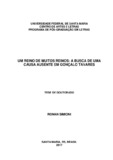| dc.creator | Simioni, Ronan | |
| dc.date.accessioned | 2018-08-29T19:40:45Z | |
| dc.date.available | 2018-08-29T19:40:45Z | |
| dc.date.issued | 2017-12-20 | |
| dc.identifier.uri | http://repositorio.ufsm.br/handle/1/14124 | |
| dc.description.abstract | Our study arises from the imperative need to understand the current historical
moment that we live. The the second decade of the twenty-first century early years
have shown the reappearance of movements that we supposed to be only in the
documents that record our past times. However, this period has revealed that the
global territorial disposition still presents itself as unfinished and that the rise of
fundamentalist movements (in both political and religious spheres) has not
disappeared from our reality. In an attempt to answer our questions, we have chosen
the literary text, considering its privileged place occupied in relation to the capture of
the real, as a way of access to the understanding of the world sought here. Thus, is
the tetralogy O Reino of the Angolan writer residing in Portugal Gonçalo M. Tavares,
that serves as analysis object in the present paper. In these four narratives, is
possible to visualize the representation of various events alluding to facts recorded
throughout history. So, we divided our analysis of the works into three different
moments. Initially, we are concerned with demarcating this referentiality from the first
two novels of the series: Um Homem: Klaus Klump and A Máquina de Joseph
Walser, in which the imperialist impulse and the use of violence make up the tonic of
actions. Jerusalém, the third of the four texts brings with it the representation of
individuals strongly traumatized by events similar to those seen in previous times,
beings reduced to the lowest human life common denominator. In the sequence,
Aprender a Rezar na era da Técnica emerges as the formulation of a new
government clearly with totalitarian inclinations, element that in addition to
demarcating certain cyclical involving the four narratives, portrays the strong
connection between them allowing this division in three interconnected moments.
Finally, we discuss the idea of Absent Cause, our main analytical postulate used in
order to better understand the tavarian narratives, relating it to the current
possibilities of Historical Novel. | eng |
| dc.description.sponsorship | Coordenação de Aperfeiçoamento de Pessoal de Nível Superior - CAPES | por |
| dc.language | por | por |
| dc.publisher | Universidade Federal de Santa Maria | por |
| dc.rights | Attribution-NonCommercial-NoDerivatives 4.0 International | * |
| dc.rights.uri | http://creativecommons.org/licenses/by-nc-nd/4.0/ | * |
| dc.subject | Gonçalo Tavares | por |
| dc.subject | O Reino | por |
| dc.subject | Causa ausente | por |
| dc.subject | Romance histórico | por |
| dc.subject | Absent cause | eng |
| dc.subject | Historical novel | eng |
| dc.title | Um reino de muitos reinos: a busca de uma causa ausente em Gonçalo Tavares | por |
| dc.title.alternative | A kingdom of many kingdoms: the search for an absent cause in Gonçalo Tavares | eng |
| dc.type | Tese | por |
| dc.description.resumo | Nossa reflexão surge da necessidade imperativa de compreender o atual momento
histórico que vivemos. Os primeiros anos da segunda década do século XXI têm
mostrado o reaparecimento de movimentos que até então supostamente estariam
superados e confinados apenas aos documentos que registram nossos tempos
passados. No entanto, esse período tem revelado que a disposição territorial do
globo ainda apresenta-se como inacabada e que a ascensão de movimentos
fundamentalistas (tanto na esfera política como religiosa) não se apagou de nossa
realidade. Em uma tentativa de resposta às nossas indagações, elegemos o texto
literário, tendo em vista o local privilegiado por ele ocupado no que tange a captação
do real, como via de acesso à compreensão do mundo aqui buscada. Assim, é a
tetralogia O Reino, do escritor angolano radicado em Portugal Gonçalo M. Tavares,
que serve de objeto de análise no presente trabalho. Nessas quatro narrativas, é
possível a visualização da representação de vários eventos alusivos a
acontecimentos registrados ao longo da história. Assim, dividimos nossa análise das
obras em três momentos distintos. Inicialmente, nos preocupamos em demarcar
essa referencialidade a partir dos dois primeiros romances da série: Um Homem:
Klaus Klump e A Máquina de Joseph Walser , nas quais o impulso imperialista e o
uso da violência compõem a tônica das ações. Jerusalém o terceiro dos quatro
textos traz consigo a representação de indivíduos fortemente traumatizados por
eventos semelhantes aos vistos nos momentos anteriores, seres reduzidos ao
mínimo denominador comum da vida humana. Na sequência, Aprender a Rezar na
Era da Técnica surge como a formulação de um novo governo claramente com
inclinações totalitárias, elemento este que além de demarcar certo teor cíclico
envolvendo as quatro narrativas retrata a forte ligação entre elas permitindo, assim,
essa divisão em três momentos interligados. Por fim, debatemos a ideia de Causa
Ausente, nosso principal postulado analítico utilizado a fim de melhor
compreendermos as narrativas tavarianas relacionando-a com as atuais
possibilidades do Romance Histórico. | por |
| dc.contributor.advisor1 | Santos, Pedro Brum | |
| dc.contributor.advisor1Lattes | http://lattes.cnpq.br/8231452052035761 | por |
| dc.contributor.referee1 | Rodrigues, Inara de Oliveira | |
| dc.contributor.referee1Lattes | http://lattes.cnpq.br/9352017944659693 | por |
| dc.contributor.referee2 | Niederauer, Silvia Helena | |
| dc.contributor.referee2Lattes | http://lattes.cnpq.br/2889585218376107 | por |
| dc.contributor.referee3 | Oliveira, Raquel Trentin | |
| dc.contributor.referee3Lattes | http://lattes.cnpq.br/8414562554311704 | por |
| dc.contributor.referee4 | Umbach, Rosani Úrsula Ketzer | |
| dc.contributor.referee4Lattes | http://lattes.cnpq.br/5773862679226891 | por |
| dc.creator.Lattes | http://lattes.cnpq.br/7101082413998089 | por |
| dc.publisher.country | Brasil | por |
| dc.publisher.department | Letras | por |
| dc.publisher.initials | UFSM | por |
| dc.publisher.program | Programa de Pós-Graduação em Letras | por |
| dc.subject.cnpq | CNPQ::LINGUISTICA, LETRAS E ARTES::LETRAS | por |
| dc.publisher.unidade | Centro de Artes e Letras | por |



